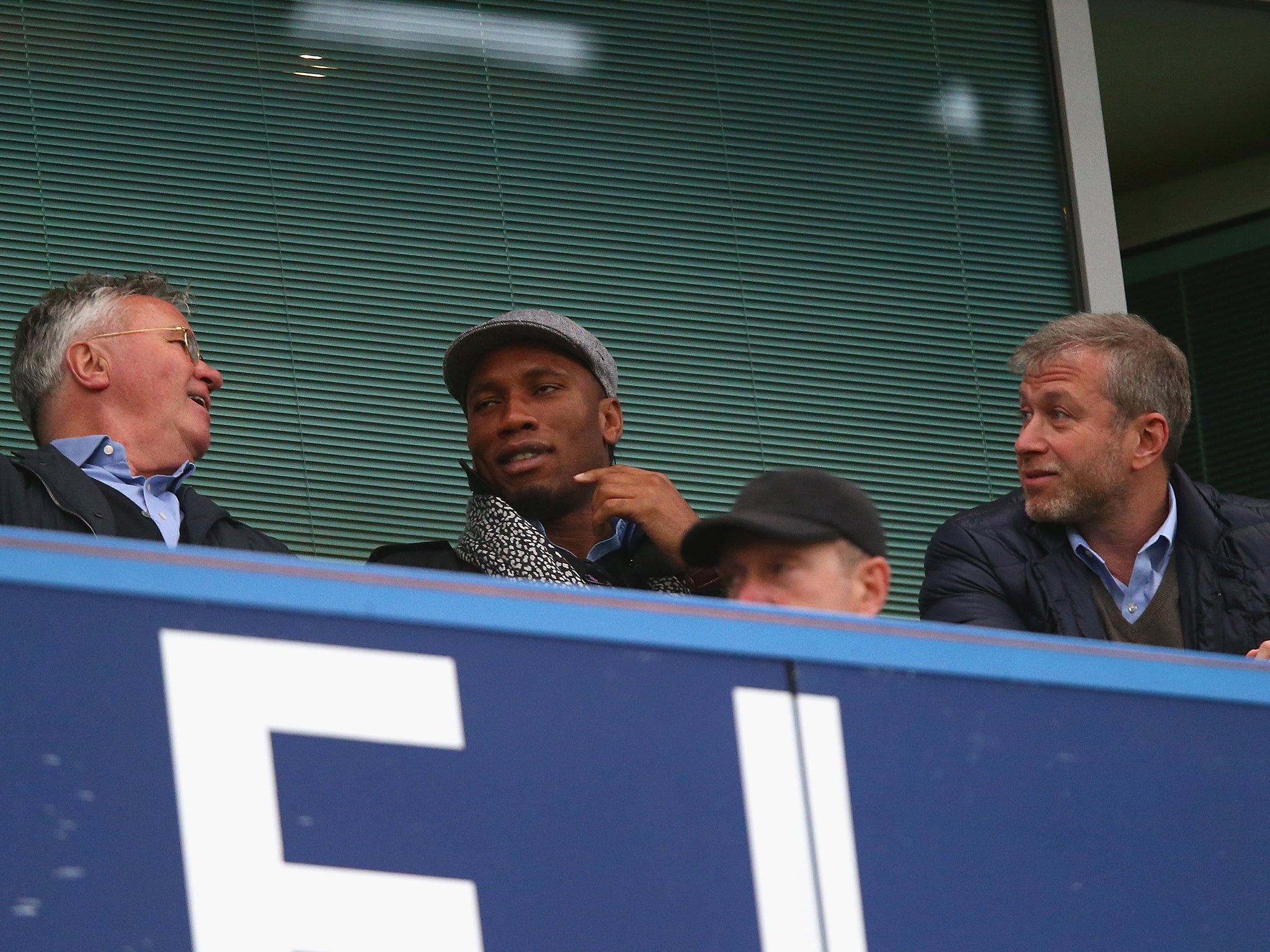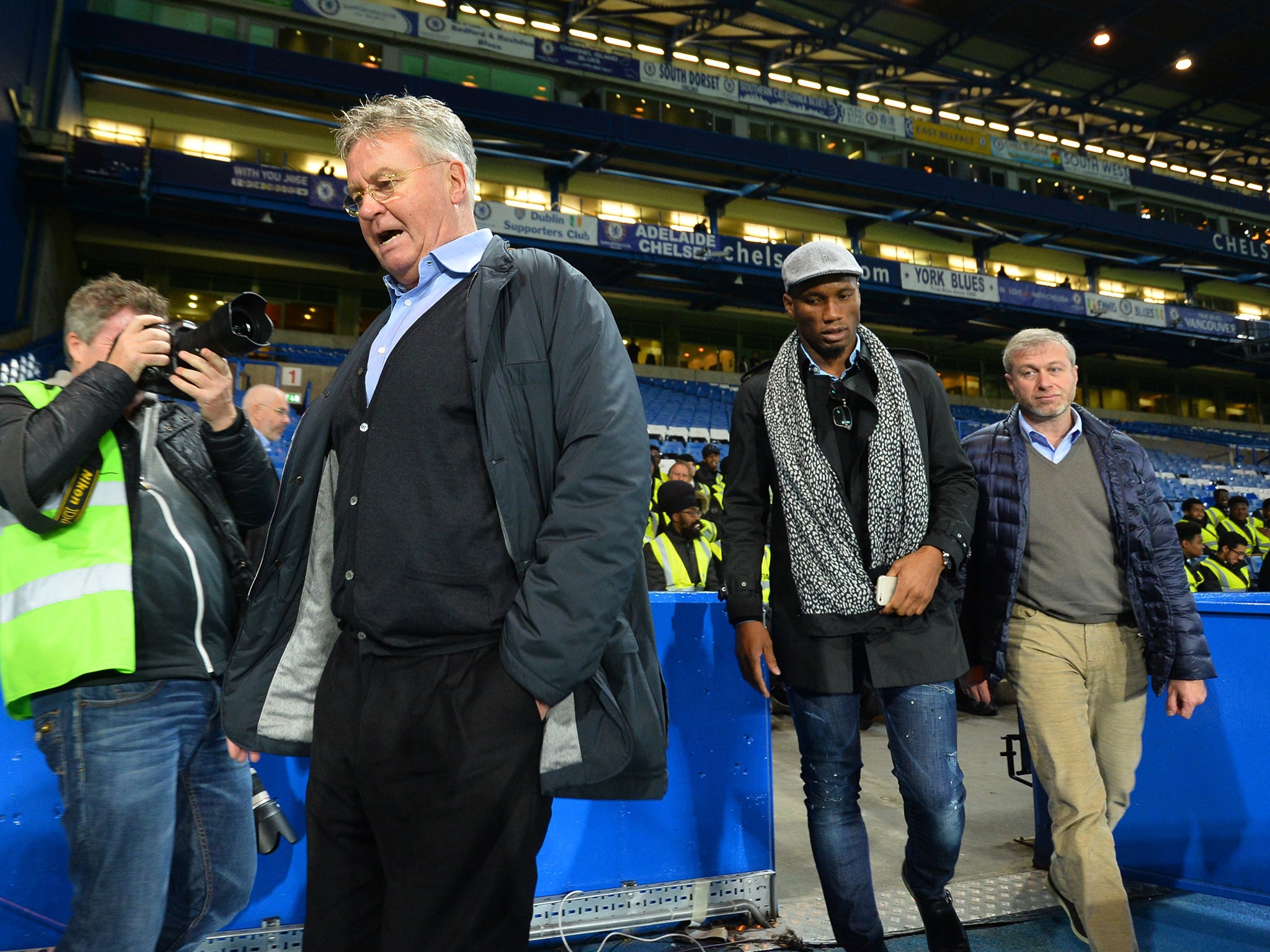Chelsea 3 Sunderland 1 reaction: Aloof Roman Abramovich gets small comfort from win
Supporters boo players they hold responsible for Mourinho’s dismissal while owner looks down on them from on high and team display renewed spirit

The discord was, indeed, palpable. On a surreal afternoon at Stamford Bridge, The Untouchables were replaced in the consciousness of Chelsea supporters by The Despicables. Local legend will record that the Special One was let down by the Three Rats.
Jose Mourinho’s name was used as an offensive weapon after each home goal. The Blue Peter warriors were led by an adolescent who flaunted a home-made banner which accused Cesc Fabregas, Diego Costa and Eden Hazard of being the aforementioned rodents.
The ritual was damningly familiar, revealingly toxic. No one was buying the saccharine-coated cyanide pills, effusive statements issued in support of the sacked manager by the likes of Fabregas, whose pleas of innocence could not prevent his name being booed lustily.
Hazard was conveniently absent with a hip injury. Costa endured the mortifying experience for someone of his machismo of being taunted with chants for his former manager when he made a long, slow angular walk to the bench after being substituted 14 minutes from time.
The search for scapegoats was extended to Pedro, whose reward for scoring Chelsea’s second goal, which effectively sealed victory within 13 minutes, was a plaintive chorus of “Where were you when you were shit?”
John Terry, who used his column in the match programme to deny rumours of player unrest, was predictably cheered, but the biggest acclaim was reserved for Willian, who has resembled a one-man team for much of a bewildering season.
Watching it all unfold, alongside Didier Drogba and Roman Abramovich in the owner’s executive eyrie, was Guus Hiddink, appointed as manager until the end of the season 90 minutes before kick-off. His presence felt like an afterthought. He is expected to reprise his role as the faithful retainer, summoned by the local squire to service his platinum-plated limousine until a new chauffeur can be found, but his future is behind him.
Financial security is not an issue, following his lucrative involvement in the implosion of Anzhi Makhach-kala’s impossible dream of European domination from Dagestan, but his professional credibility has been damaged by association with sustained failure at international level with Russia, Turkey and Holland.
Hiddink’s horizons will be limited to the accumulation of sufficient points to avoid embarrassment and the possible acquisition of the FA Cup, the bauble he won in 2009. Despite the freedom of spirit exhibited in yesterday’s suspiciously timed revival, it seems inconceivable a fractured, flawed squad can win the Champions League.
The Dutch coach’s emollient nature will be his principal asset in the initial stages of realignment and renewal, and it was no surprise he spoke of his “wonderful relationship” with Chelsea’s fans, who looked accusingly up at Abramovich when thousands followed an invitation to “stand up for the Special One”.
The fans have found their voice, in the short term at least; the disconnect between them and the club testifies to the limits of loyalty in what remains a feudal environment. Abramovich might have addressed the players through asinterpreter on Friday, but his attention was ill- directed. This was an ideal time to reassess his refusal to communicate even indirectly with supporters; submitting himself to his first interview since becoming owner in 2003 would have been an overdue statement of solidarity.
His life is, by necessity or design, opaque. This denies him the opportunity to share his evident passion for the club and promotes the perception that the fans have no value, other than to demonstrate forelock-tugging gratitude for the Russian’s largesse.
After the first week of the season Michael Calvin’s prescient column argued that Mourinho had made a major mistake in his handling of the controversy surrounding club doctor Eva Carneiro. Calvin wrote: “His wilful refusal to acknowledge an error of judgement in a delicate area of professional responsibility will return to haunt him. His achievements demand deference. His status as the pre-eminent strategic coach of his generation is well merited and constantly renewed. Yet he has lost control of the agenda in a manner which hints at fundamental weakness.”
A febrile, politically driven culture produces insubstantial courtiers like the technical director, Michael Emenalo, whose disastrously distant interview on Mourinho’s exit, which seemingly sought to scapegoat a coach he did not condescend to name, is understood to have alarmed club officials. Mourinho did not deserve such studied disrespect, even though he was sour, embittered and increasingly irrational towards the end of his second spell at Stamford Bridge.
His downfall signals the broader implications of a modern manager’s duties. Chelsea could not present themselves as a socially aware institution, with appropriate equality policies, while their most prominent employee chose to treat club doctor Eva Carneiro with such infantile, unprofessional disdain.
Modern industry acknowledges the benefits of structured sabbaticals, yet football persists in expecting their highest-profile individuals to show unhealthy resilience in what has become a draining, dehumanising profession. Mourinho’s refusal to countenance a break, highlighted in a statement issued by his agents yesterday, confirms he will continue to be his own worst enemy.
Mourinho, who watched Middlesbrough’s lunchtime win at Brighton, retained an ethereal presence in his old haunt. It was still possible to buy his 2016 calendar on the roadside stalls, and fans queued to be photographed alongside his image on the front row in Chelsea’s pre-season team shot.
Dynastic dominoes are beginning to fall. Carlo Ancelotti has committed himself to Bayern Munich, Pep Guardiola has his pick of the Premier League, and Jorge Mendes, Mourinho’s super-agent, is already getting busy on his client’s behalf. Links with Roma will not be the last.
The players he leaves behind will not care unduly about the invidious position in which they have been placed by assumptions of fecklessness. They are insulated by celebrity and attendant cheerleaders, and they would not understand the poignancy of yesterday’s death of Jimmy Hill, football’s freedom fighter.

Though player power has long been a factor, it has acquired a new subtlety. Modern chief executives and owners are hypersensitive to anything that impacts on share value, profit margins, or the process of global brand-building.
Discontented players, operating behind the human shield of their agents, are dangerous. Managers are obliged to be responsive to a club’s culture, so Louis van Gaal may rue his laboured, technocratic approach, which is the antithesis of Manchester United’s traditional faith in youth, faith, width and adventure.
Norwich fans mocked him yesterday with chants of “Jose Mourinho, he’s taking your job”. As the Bridge emptied, to the strains of Bob Marley singing “Don’t worry about a thing”, that didn’t seem such an absurd prospect.
Join our commenting forum
Join thought-provoking conversations, follow other Independent readers and see their replies
Comments